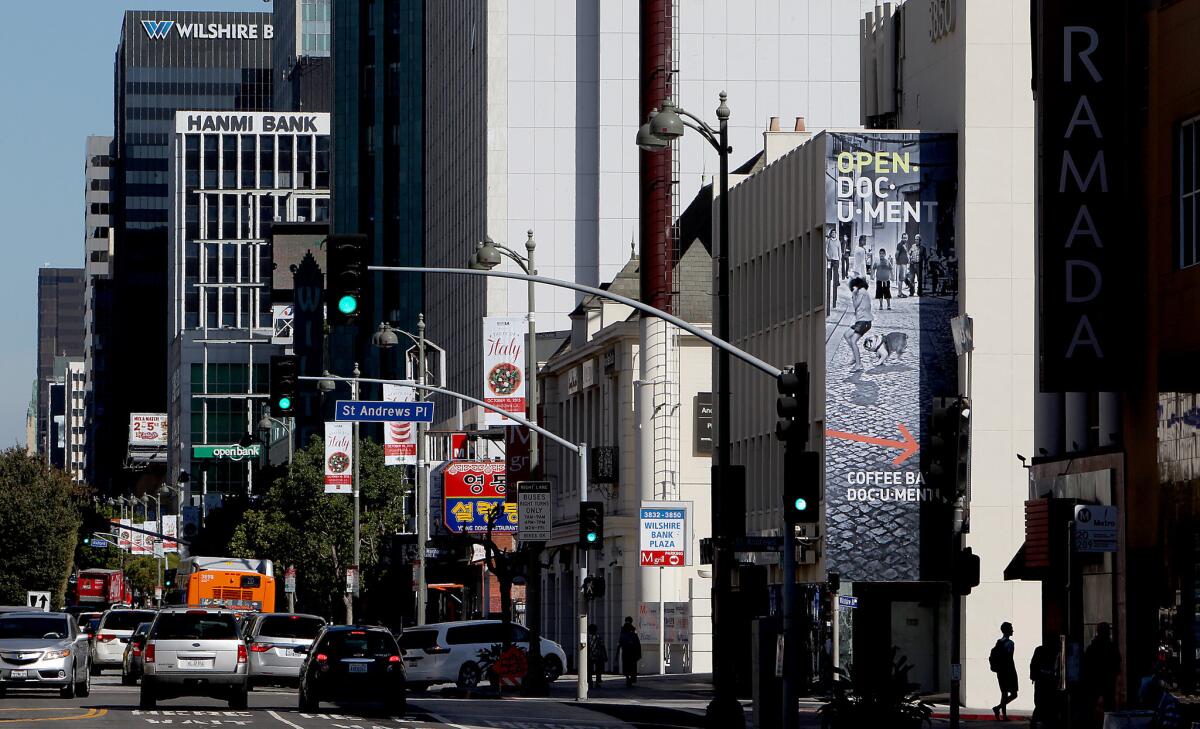L.A. County supervisors approve first stage of major Koreatown development

- Share via
L.A. County supervisors voted Tuesday to approve the first stage of a major planned development in Koreatown, including a community center for which neighborhood activists had lobbied heavily.
The so-called Vermont Corridor project will include three county-owned sites along South Vermont Avenue and will be built with a mix of public and private money.
The dilapidated headquarters of the county Department of Mental Health will be turned into a 172-unit residential complex. A new mental health headquarters will be built on a lot down the street, occupied now by an abandoned building and an office building for other county workers. A third site that houses offices for county parks and recreation staff will be turned into a 72-unit affordable-housing development for seniors, with a community center.
Plans to redevelop the county-owned sites on Vermont have been in the works for more than two years, but the community center is a relatively recent addition to the project.
Koreatown activists have long decried the lack of community gathering spaces in the neighborhood, which is by some measures the most densely populated in Los Angeles. They have been advocating for the inclusion of a community center in the planned Vermont Corridor development in public comments at supervisors’ meetings and in talks with county staff.
On Tuesday, more than 100 residents and community members — many wearing T-shirts and carrying signs reading “Koreatown” — filed into the county meeting room to voice support for the proposed center, while some advocated for it to be increased in size.
“As a kid summer vacations meant hours in front of the TV, with no park or community centers to go to,” Scarlett De Leon, an organizer with Koreatown Immigrant Workers Alliance, told the supervisors. De Leon said her younger brother and sister are growing up the same way, while her grandmother also spends her days in a one-bedroom apartment.
“My grandma, my brother, my sister, like many, need a safe space in Koreatown,” she said.
Organizers said the plans for a community center, committed to in writing for the first time last week after months of lobbying, marked a watershed moment for Koreatown’s activism and empowerment.
In recent years, Koreatown has started voicing its demands as a united front, only to be met with one disappointment after another. The push for a much-needed park that started in 2009 fizzled to an end a couple years later. A redistricting fight in 2012 to get all of Koreatown in one council district ignited rancor and division and was ultimately unsuccessful.
The center, if constructed, would be a hard-won victory in an area with new developments cropping up left and right but scant community resources.
“It’s a once-in-a-lifetime opportunity,” organizer Caroline Sim told supervisors. “Please include us in the process.”
Representatives of the YMCA, which opened its newest location in Koreatown in 2014, told supervisors Tuesday they were “bursting at the seams” with the pent-up demand in the neighborhood. The YMCA is expected to manage the new community center.
Supervisors approved an initial agreement with a development team Tuesday and $10.5 million to be spent on pre-development work. Supervisor Mark Ridley-Thomas, who represents the area, pointed out that the community center is just one piece of the ambitious development plan.
“There will no longer be those blighted buildings essentially discouraging development on the part of the private sector,” he said. “There will no longer be these terrible facilities where our county employees have to work and our constituents have to then seek services.”
The county expects to spend about $270 million to build the new mental health headquarters, but probably won’t pay for the construction directly. Instead, a nonprofit set up for the project is expected to issue tax-exempt bonds to build it, which the county would pay back through lease payments on the building. The debt service will cost the county an estimated $15.3 million a year.
The private developers on the project will be responsible for coming up with financing to build the housing and community center. They include Trammell Crow Co., which also recently broke ground on a major mixed-use project on county-owned land in downtown Los Angeles; and affordable housing developer Meta Housing Corp.
County Community Development Commission head Sean Rogan says the county expects to get about $500,000 a year in income from the market-rate housing once it is completed.
Twitter: @sewella
Twitter: @vicjkim
ALSO
For LAPD cops, walking the Koreatown beat filled with mystery, confusion, cultural minefields
Coyote attacks force closure of Montebello park: ‘People are not food for coyotes’
‘Pillowcase Rapist’ Christopher Hubbart back in custody after failing to meet release terms
More to Read
Sign up for Essential California
The most important California stories and recommendations in your inbox every morning.
You may occasionally receive promotional content from the Los Angeles Times.












